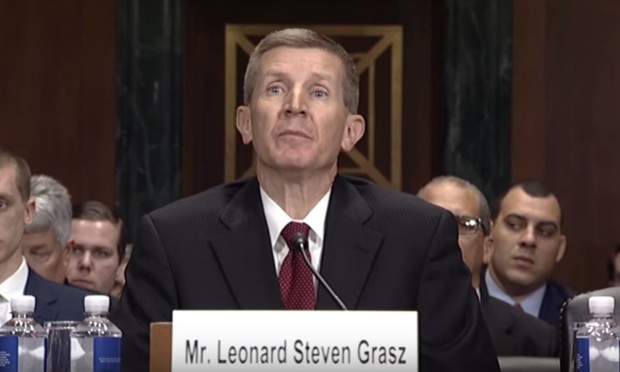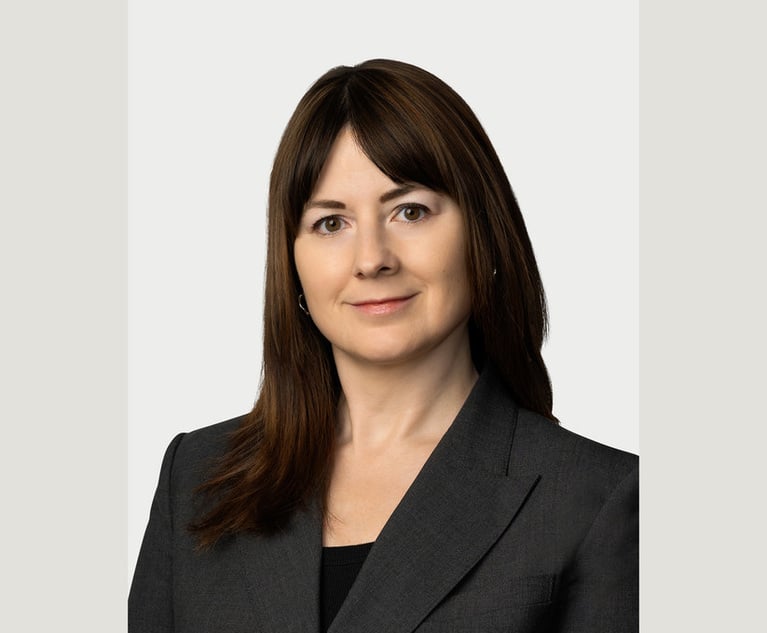Religious Worker Protections Remain Unsettled in Post-'Abercrombie' Era
A recent split panel ruling in the U.S. Court of Appeals for the Eighth Circuit narrowed the avenues a worker can take to fight alleged religious-protection violations. The case highlighted the unsettled landscape for companies, their employees and the courts.
November 30, 2018 at 01:53 PM
7 minute read
 U.S. Supreme Court building in Washington, D.C. Photo: Diego M. Radzinschi/ALM
U.S. Supreme Court building in Washington, D.C. Photo: Diego M. Radzinschi/ALM
Emily Sure-Ondara had secured a position at North Memorial Health Care until she explained to the Minnesota hospital that as a Seventh-day Adventist she would observe the sabbath sundown on Friday to sundown on Saturday.
The registered nurse's request to not work weekends clashed with a requirement—negotiated by the nurses' union and the hospital—that employees work weekends every other week. Her job offer was rescinded, even after she said she would work without the religious accommodation.
A federal appeals court panel this month, ruling for North Memorial, upheld the dismissal of a retaliation lawsuit that the U.S. Equal Employment Opportunity Commission filed on Sure-Ondara's behalf in 2015.
The split panel ruling in the U.S. Court of Appeals for the Eighth Circuit, which covers a broad swath of the midwest, narrowed the avenues a worker can take to fight alleged religious-protection violations.
The case also highlights the unsettled landscape for companies, their employees and the courts, often forced to reckon with this slice of Title VII of the Civil Rights Act that provides protections for religious beliefs. Federal courts remain torn over the scope of religious accommodations since a landmark Supreme Court ruling three years ago that was heralded as a win for employee rights.
“The decision shows there is more work to be done,” Daniel Mach, director of the American Civil Liberties Union Program on Freedom of Religion and Belief, said of the recent ruling.
The three-judge Eighth Circuit panel, which included Trump-appointed judges ruling on opposing sides of the case, found the hospital's response to Sure-Ondara's request for an accommodation didn't amount to retaliation.
The company's attorneys at Fredrikson & Byron did not respond to request for comment. The EEOC declined to comment on whether the agency planned to further press its appeal. A spokesperson for the hospital said in a statement: “North Memorial Health has and expects to continue its established practice of granting requests for religious accommodation on a case by case basis.”
Advocates and religious organizations had predicted wide consequences of a ruling that went against Sure-Ondara and the EEOC. A friend-of-the-court brief said a ruling for the hospital could “eliminate the rights of employees who would seek accommodations. And avoiding that result is the whole point of the retaliation provision.”
Open Questions After 'Abercrombie'
The last major U.S. Supreme Court ruling addressing religious accommodation came in 2015 in the case EEOC v. Abercrombie & Fitch. The court found the clothing retailer discriminated against a Muslim woman when it did not hire her because the hijab she wore clashed with the company's “look” policy. Workers rights advocates hailed the ruling as a victory for religious beliefs. But companies still face a balancing act.
“The Supreme Court has made clear that employers need to take their Title VII obligations seriously,” Mach of the ACLU said. “The Abercrombie decision sent a broader message of the importance of providing reasonable religious accommodations in the workplace, but the outcomes, including this North Memorial decision, have been a mixed bag.”
The Abercrombie decision, the recent Eighth Circuit ruling and other cases in appeals courts reveal the complexities of religious accommodation cases. Accommodating a worker's religious beliefs pose unique challenges beyond protected employment categories such as race and gender.
“The fundamental aspect most employment laws address is to say that an employer should treat employees the same. That's true for religion, as well, but it goes one step further,” said Todd McFarland, associate general counsel to the General Conference of Seventh-day Adventists, which filed an amicus brief in support of Sure-Ondara. “You have to do something different for them and give them preferential treatment. Courts have struggled with that.”
McFarland said this clash between business interests and workers' religious rights is likely to continue. “We will see more defendants and circuits wrestling with this. This is not going away.”
In the years since Abercrombie, religious accommodation lawsuits filed against companies have seen a steady uptick. The EEOC has tracked a gradual increase in these cases in recent decades.
In the last few years, the agency has defended workers in lawsuits that confront employers over requests for religious days of rest and myriad reasons that include grooming policies, wardrobe and vaccinations.
Employment attorneys had predicted the Abercrombie decision would not provide definitive guidance on how to settle religious accommodation disputes. This proved prescient.
➤➤ Get employment law news and commentary straight to your in-box with Labor of Law, a new Law.com briefing. Learn more and sign up here.
In the Fourth Circuit, a worker prevailed in a 2017 ruling when he claimed a biometric hand scanner would be akin to the Book of Revelation's “Mark of the Devil.” The Eleventh Circuit ruled against a Walgreens worker who wanted his schedule to accommodate the sabbath. His attorneys asked the Supreme Court to take up that case on appeal, in a petition noting deep divisions in this area.
Each case raises a specific question under the religious accommodation umbrella. The Eighth Circuit majority opinion focused on whether Sure-Ondara's request for an accommodation amounted to protected activity.
The court found that “merely requesting a religious accommodation is not the same as opposing the allegedly unlawful denial of a religious accommodation.” It also said, however, that a Title VII retaliation claim could be asserted in other contexts involving requests.
Paul Mollica, counsel at Outten & Golden in Chicago, called the court's ruling a “wooden” interpretation.
“The majority opinion takes an unrealistically narrow view on how employees and employers operate,” he said.
Mollica said there were parallels to the Abercrombie ruling, in that the employer appeared to withhold or rescind a job offer because of “anticipated trouble.” In Abercrombie, the company said it did not know the headscarf worn by the applicant was based on a religious belief. The high court was not convinced and held the company liable. In Sure-Ondara's case, Mollica said it should have been clear she was entitled to an accommodation, even if she didn't “utter the magic words.”
 Leonard Steven Grasz appeared last year for his confirmation hearing. Credit: YouTube.
Leonard Steven Grasz appeared last year for his confirmation hearing. Credit: YouTube.The three-judge panel saw two Trump-appointed judges on opposites sides of the debate with Judge Ralph Erickson in the majority and Judge Leonard Steven Grasz in the dissent. Grasz said Sure-Ondara's accommodation should have been considered protected activity.
“Common sense dictates that requesting a religious accommodation in most circumstances communicates support for the grant of the request and opposition to its denial,” Grasz wrote. “In other words, the request itself conveys opposition to the employer's failure to accommodate the applicant's (or employee's) religion.”
Setting “too high a standard for opposition,” Grasz said, “could have the unintended effect of forcing requesters to take a confrontational approach in order to be afforded Title VII's protections against retaliation.”
Greg Grisham, of counsel for Fisher Phillips in Memphis, said in a recent client advisory that while the Eighth Circuit decision provides fewer options for workers, it does not create any clear lane for companies to deny religious accommodations.
“The decision does not impact your Title VII obligation to accommodate applicants or employees absent undue hardship when your policies or practices create a conflict with an employee's or applicant's religious belief or practice,” Grisham said.
Read more:
Inside an Educational Tech Company's Trial Victory Against the EEOC
DOJ Takes Stance Against Transgender Rights—and the EEOC—in Supreme Court
Employment Law Implications After US House Flips to Dems
Business Groups Press Supreme Court to Reverse Gender-Pay Ruling
This content has been archived. It is available through our partners, LexisNexis® and Bloomberg Law.
To view this content, please continue to their sites.
Not a Lexis Subscriber?
Subscribe Now
Not a Bloomberg Law Subscriber?
Subscribe Now
NOT FOR REPRINT
© 2025 ALM Global, LLC, All Rights Reserved. Request academic re-use from www.copyright.com. All other uses, submit a request to [email protected]. For more information visit Asset & Logo Licensing.
You Might Like
View All
‘Diminishing Returns’: Is the Superstar Supreme Court Lawyer Overvalued?

DC Lawsuits Seek to Prevent Mass Firings and Public Naming of FBI Agents
3 minute read
Trending Stories
- 1The End of Innocence? DEP’s End Run Around ‘All Appropriate Inquiry’ Spill Act Protections
- 2Pistachio Giant Wonderful Files Trademark Suit Against Canadian Maker of Wonderspread
- 3New York State Authorizes Stand-Alone Business Interruption Insurance Policies
- 4Buyer Beware: Continuity of Coverage in Legal Malpractice Insurance
- 5‘Listen, Listen, Listen’: Some Practice Tips From Judges in the Oakland Federal Courthouse
Who Got The Work
J. Brugh Lower of Gibbons has entered an appearance for industrial equipment supplier Devco Corporation in a pending trademark infringement lawsuit. The suit, accusing the defendant of selling knock-off Graco products, was filed Dec. 18 in New Jersey District Court by Rivkin Radler on behalf of Graco Inc. and Graco Minnesota. The case, assigned to U.S. District Judge Zahid N. Quraishi, is 3:24-cv-11294, Graco Inc. et al v. Devco Corporation.
Who Got The Work
Rebecca Maller-Stein and Kent A. Yalowitz of Arnold & Porter Kaye Scholer have entered their appearances for Hanaco Venture Capital and its executives, Lior Prosor and David Frankel, in a pending securities lawsuit. The action, filed on Dec. 24 in New York Southern District Court by Zell, Aron & Co. on behalf of Goldeneye Advisors, accuses the defendants of negligently and fraudulently managing the plaintiff's $1 million investment. The case, assigned to U.S. District Judge Vernon S. Broderick, is 1:24-cv-09918, Goldeneye Advisors, LLC v. Hanaco Venture Capital, Ltd. et al.
Who Got The Work
Attorneys from A&O Shearman has stepped in as defense counsel for Toronto-Dominion Bank and other defendants in a pending securities class action. The suit, filed Dec. 11 in New York Southern District Court by Bleichmar Fonti & Auld, accuses the defendants of concealing the bank's 'pervasive' deficiencies in regards to its compliance with the Bank Secrecy Act and the quality of its anti-money laundering controls. The case, assigned to U.S. District Judge Arun Subramanian, is 1:24-cv-09445, Gonzalez v. The Toronto-Dominion Bank et al.
Who Got The Work
Crown Castle International, a Pennsylvania company providing shared communications infrastructure, has turned to Luke D. Wolf of Gordon Rees Scully Mansukhani to fend off a pending breach-of-contract lawsuit. The court action, filed Nov. 25 in Michigan Eastern District Court by Hooper Hathaway PC on behalf of The Town Residences LLC, accuses Crown Castle of failing to transfer approximately $30,000 in utility payments from T-Mobile in breach of a roof-top lease and assignment agreement. The case, assigned to U.S. District Judge Susan K. Declercq, is 2:24-cv-13131, The Town Residences LLC v. T-Mobile US, Inc. et al.
Who Got The Work
Wilfred P. Coronato and Daniel M. Schwartz of McCarter & English have stepped in as defense counsel to Electrolux Home Products Inc. in a pending product liability lawsuit. The court action, filed Nov. 26 in New York Eastern District Court by Poulos Lopiccolo PC and Nagel Rice LLP on behalf of David Stern, alleges that the defendant's refrigerators’ drawers and shelving repeatedly break and fall apart within months after purchase. The case, assigned to U.S. District Judge Joan M. Azrack, is 2:24-cv-08204, Stern v. Electrolux Home Products, Inc.
Featured Firms
Law Offices of Gary Martin Hays & Associates, P.C.
(470) 294-1674
Law Offices of Mark E. Salomone
(857) 444-6468
Smith & Hassler
(713) 739-1250









